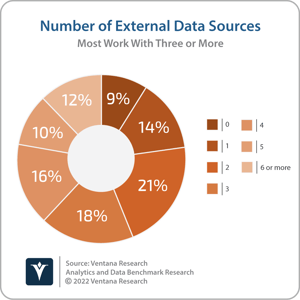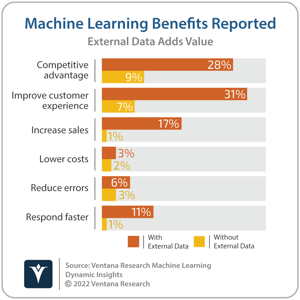The Value of External Data
As organizations become more sophisticated in the use of data, the integration of external data grows in importance and frequency. Our Analytics and Data Benchmark Research shows that 9 in ten (90%) participants consider external data to be important for their organization’s analytic efforts.
External data helps provide a comprehensive picture of an organization’s customers, suppliers, partners and even competitors. Several sources are commonly used, including location, economic, social media, demographic, government, market and weather data. Our research shows that more than one-half (56%) of organizations incorporate three or more external sources in data processes.
commonly used, including location, economic, social media, demographic, government, market and weather data. Our research shows that more than one-half (56%) of organizations incorporate three or more external sources in data processes.
External data adds value to both analytics and operations. Common analytical examples include granting credit, determining fraud, planning logistics and forecasting demand. However, operational processes also benefit from analytics that incorporate external data. Validating shipping addresses, for example, can use external data to reduce lost or returned shipments. Augmenting internal data for outbound marketing campaigns and sales prospecting efforts can increase conversions. As more operational processes incorporate analytics, the line between analytics and operations will blur.
Most organizations work with external data in a way that inhibits its use and value. Contracts for individual data sources are negotiated, executed and managed separately. Data users often receive little assistance for incorporating the data into their processes or keeping it up to date. Vendors provide integrations or APIs, but the customer is left to figure out the rest on their own. Governance and oversight can be difficult given the range of independent users. Adopting an external data platform can update an organization’s approach and make working with external data more effective.
Make It Easier to Work with External Data
For all of the benefits of incorporating external data in analytics, there are still challenges. Working with multiple sources can increase the complexity of analytics. Many organizations manage each external data source and vendor separately. A shopper would not go to 10 different stores to buy groceries, yet many organizations contract or interact with 10 different external data providers. One avenue for simplifying access, procurement and management of this data is to move from point-to-point interactions to a consolidated acquisition approach. Data marketplaces are emerging as a resource for aggregated access but offer no assistance with data usage or procurement.
Organizations can also realize external data processing efficiencies by streamlining use and data preparation. It is important to recognize that accessing and preparing any data, including external data, can be-png.png?width=300&name=VR_2022_Data_Assertion_1_Square%20(1)-png.png) challenging. More than two-thirds (69%) of organizations cite accessing and preparing data as the most time-consuming part of the analytics process, and more than one-third (35%) report they don’t have adequate skills for data preparation. External data platforms can assist with accessing, matching, merging and integrating internal data sources.
challenging. More than two-thirds (69%) of organizations cite accessing and preparing data as the most time-consuming part of the analytics process, and more than one-third (35%) report they don’t have adequate skills for data preparation. External data platforms can assist with accessing, matching, merging and integrating internal data sources.
Artificial intelligence and machine learning make it easier to work with external data. Advanced external data platforms incorporate AI/ML to automate data enrichment, discovery and utilization. For example, based on the data sources selected, AI/ML can identify other relevant external data. Data platforms also use AI/ML to automatically enhance existing analyses with external data for increased accuracy. We assert that by 2025, more than two-thirds of all data processes will use AI/ML to boost the value derived from data.
Modernize the Approach to External Data
An external data platform offers efficiencies and enhancements for improved analytic outcomes with simplified external data procurement and management. By streamlining access, acquisition and maintenance of sources, organizations experience easier integration with a wider range of data, encouraging experimentation and exploration for better analyses. The system identifies who is utilizing the data and how it is being used for improved management of data governance, compliance and privacy requirements. These benefits deliver a more complete analytic picture as well as better financial controls over multiple external data sources.
External data also enhances AI/ML activities. Organizations are expanding use of AI/ML, with nearly 9 in ten (87%) using or planning to use these advanced technologies. There is no end in sight—none of these organizations report plans to reduce usage, and nearly three-quarters (72%) plan to increase usage. Enriching AI/ML analytics with external data improves models and analyses, resulting in better business outcomes. Our research shows that organizations using external data in AI/ML processes are more likely to achieve a competitive advantage, improve customer experiences and increase sales.
Cloud-based services can reduce workload and enable access for self-serve analytics. Many administrative and maintenance tasks associated with external data can be off-loaded by using cloud computing. Less time is spent managing sources because the platform provider maintains all the systems and storage necessary for the entire universe of data, and ensures the latest data is available. Cloud-based services are easily accessible throughout the organization, and can complement on-premises, cloud-based and hybrid systems.
external data can be off-loaded by using cloud computing. Less time is spent managing sources because the platform provider maintains all the systems and storage necessary for the entire universe of data, and ensures the latest data is available. Cloud-based services are easily accessible throughout the organization, and can complement on-premises, cloud-based and hybrid systems.
External data adds value by improving analyses for better business outcomes. An enhanced data platform can deliver improved analytic efforts while reducing the complexity of working with multiple sources as well as streamlining use and data preparation. Moving from an ad hoc management approach to a formal strategy ensures access to the right data, maximizing results while minimizing costs.
About Ventana Research
Ventana Research is the most authoritative and respected benchmark business technology research and advisory services firm. We provide insight and expert guidance on mainstream and disruptive technologies through a unique set of research-based offerings including benchmark research and technology evaluation assessments, education workshops and our research and advisory services, Ventana On-Demand. Our unparalleled understanding of the role of technology in optimizing business processes and performance and our best practices guidance are rooted in our rigorous research-based benchmarking of people, processes, information and technology across business and IT functions in every industry. This benchmark research plus our market coverage and in-depth knowledge of hundreds of technology providers means we can deliver education and expertise to our clients to increase the value they derive from technology investments while reducing time, cost and risk.
Ventana Research provides the most comprehensive analyst and research coverage in the industry; business and IT professionals worldwide are members of our community and benefit from Ventana Research’s insights, as do highly regarded media and association partners around the globe. Our views and analyses are distributed daily through blogs and social media channels including Twitter, Facebook, and LinkedIn.
To learn how Ventana Research advances the maturity of organizations’ use of information and technology through benchmark research, education and advisory services, visit www.ventanaresearch.com.
